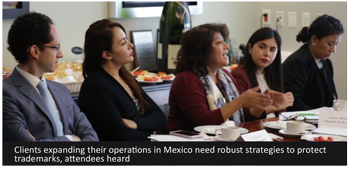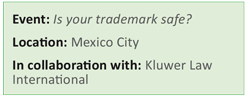Trademarks weakened by Mexico’s new opposition to registration system
System imposes additional requirements that, if unfulfilled, make trademarks vulnerable to new challenges – consequently, clients must strengthen their IP protection strategies
The new opposition to registration system in Mexico makes trademarks weaker and more vulnerable to challenge, an audience of intellectual property (IP) lawyers and experts heard at a recent debate in Mexico City.
Under the new system, trademark applications are published by the Mexican Trademark Office in the Industrial Property Gazette within ten days of them being filed. Any third party who believes that the trademark conflicts with any of the legal impediments stated in articles 4 and 90 of the Industrial Property Law, may file a written opposition within one month of the application being published.
Attendees at the event – which was organised with the support of Kluwer Law International and hosted by The Latin American Lawyer at the offices of law firm Basham, Ringe y Correa –expressed concern that the new system could make trademarks more likely to be subject challenges.
New loopholes
Event panellist Adolfo Athié, partner at Basham, Ringe y Correa said: “In my view, far from making trademarks stronger and safer, the recent reform of the opposition system tends to make trademarks weaker, or at least there are more arguments for challenging.” He added that the new system also imposes additional requirements and if a trademark fails to fulfil any of them during registration, then it becomes “vulnerable to challenges based on those unfulfilled requirements”. Athié continued: “Unfortunately, the opposition system provides loopholes to challenge grants or rejections of registrations.”
However, participants heard that following existing protocols can make proceedings more straightforward. The consensus among attendees was that while the opposition system might fall short of expectations, it is a useful tool for the safeguard of trademarks.
 Trademark trolls
Trademark trolls
It was also argued that companies should be aware of the consequences of negotiating with trademark trolls, and must consider alternative courses of action, including tactical litigation. Lawyers and other IP experts have an important role in helping make trademarks safer in Mexico, the audience heard. This can be achieved by becoming a business partner to the company, providing “preventative counsel” and litigating when it becomes necessary.
Meanwhile, setting up an IP strategy as part of a wider business strategy is vital. Lawyers can also help promote cultural change within companies, providing training to staff and highlighting the business case for protecting trademarks. Moreover, lawyers, as members of the local bar, can push for modifications to legislation to strengthen trademark protection and also make the case for more IP training for judges.
Cost-benefit analysis
Bernardo Herrerías, partner at Hogan Lovells, said that international clients seeking to expand their operations in Mexico should ensure they have robust strategies for protect their trademarks. He added: “First, clients should find a good adviser, not just from the legal side but also from a business perspective, with local experience – the first course of action is to secure protection in Mexico.” Herrerías said that sometimes clients are concerned about the costs associated with this process, but he argued that the cost-benefit of investing in trademark protection is “better than the alternative, which could be a lawsuit”.
Training is also crucial, said Herrerías. “Clients need to do training on what their people can and can´t do, always bearing in mind that intellectual property needs to be respected and protected.”
















